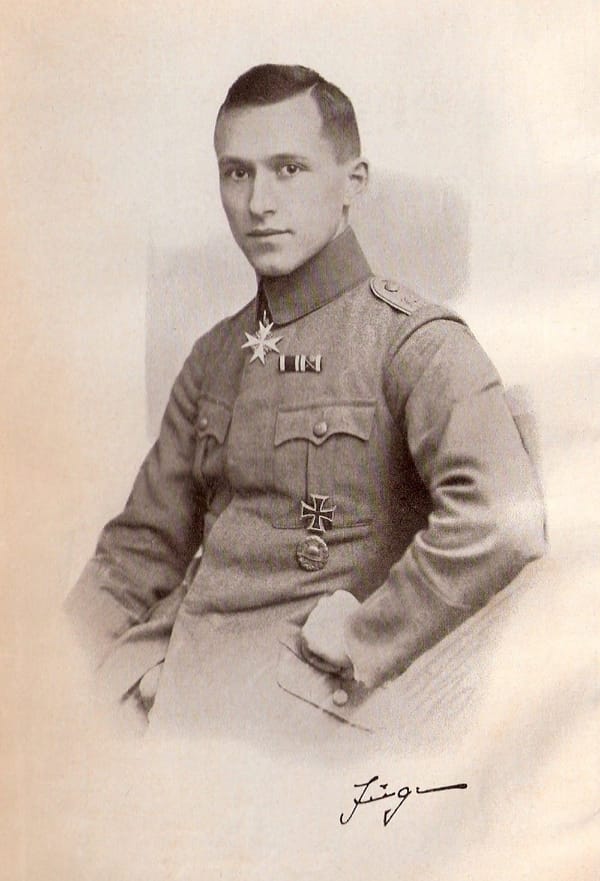Approaches: Drugs and Altered States
By Ernst Jünger
Telos Press, 406 pages, $29.95
Ernst Jünger is increasingly recognized as one of the great conservative writers and thinkers of the 20th century. It might surprise some of his admirers, then, that he indulged extensively in psychoactive drugs throughout his life. His account of these experiences is now available in English as Approaches: Drugs and Altered States. The book documents Jünger’s experiences with everything from alcohol to hashish and mescaline and LSD. What drove his experimentation was a conviction he shared with other modernist artists, as well as other conservative critics of modernity (two categories with considerable overlap): that the most vital parts of human experience lie outside the scope of the rational mind.
Jünger’s quest for truth in nonrational mental states began in the trenches of World War I, during which he was wounded seven times. He was heavily decorated for his valor, and gained further renown with the 1920 publication of the wartime diary that became his first book, Storm of Steel, in which he captured the surreal intensity of modern warfare. In war, he writes there, “you tremble with two contradictory impulses: the heightened awareness of the huntsmen, and the terror of the quarry. You are a world to yourself, saturated with the appalling aura of the savage landscape.”
After he was discharged from the army, Jünger sought out new portals to the transcendental. He found one in literary experimentation, remaining prolific in multiple genres until his death in 1997 at the age of 103. Alongside this artistic activity, Jünger used deliberate and calculated experimentations with drugs to recreate or, at least, recall the moments of combat that had brought him close to—for lack of a better term—God.
Russell Berman writes in the introduction of the new translation that “Approachesis a fundamentally philosophical, even spiritual journey towards hidden dimensions of existence that, in Jünger’s view, have been eclipsed by the ambient noise of modern life.” The book is also a record of literal journeys, where the drugs consumed in different locations reveal deeper spiritual conditions. In Europe, where we see him hitting the booze, snorting cocaine, and shooting morphine, drugs prove symptomatic of a spiritual vacuum. They are designed to numb the mind and the body, to dull pain so as to enable work in the industrial economy. “Where drugs are used in the machine world, it is … to enhance normal levels,” writes Jünger. The denizens of the West drink or shoot morphine to cope, not to transcend. At the same time, Jünger sees the thirst for alcohol as a misplaced thirst for spiritual awareness. The alcoholic doesn’t drink solely to escape his own misery, but yearns to drink himself to a place where all physical need has been escaped, “where grief itself does not exist.”
In modern European civilization, Jünger finds only denial of the transcendent truths he seeks, so his quest takes him elsewhere. In Asia and the Middle East, he indulges in opium and hashish, comparing his experiences to those of the 19th-century literary “opium eater” Thomas de Quincey. His use of pharmaceutical-grade morphine in Europe is, while not unpleasant, devoid of the mystical insights gained by de Quincey. But while in the East and using non-processed opium, Jünger experiences dreamlike visions and describes in detail the peculiar liminal state of opiated sleeplessness. He finds in that state a departure from linear time. “The ancients loved comparing sleep and death,” he writes. “We all sense that the coming of day robs us of something; it forces us back into time.”
It is in pre-industrialized Mexico, a land he regards as still bound by nature, that Jünger experiences psychoactive drugs to which he attributes a truly mind-freeing impact: psilocybin mushrooms, peyote, and LSD. Documenting his psilocybin trip, Jünger gets closest to the illuminated state he has been looking for. “The touch became light,” he writes. “The light was multicolored; it arranged itself into strings that swayed gently back and forth, like glass bead curtains over an oriental doorway. The doors they formed were like those we pass in dreams.” The effects of acid are just as mind-blowing but evoke different insights. If mushrooms rooted Jünger in the earth, acid—which he sampled in the company of its accidental discoverer, Albert Hofmann—elevates him to realms beyond the earth.
“Jünger refuses all moralization of psychoactive substances.”
Even as Jünger refuses all moralization of psychoactive substances, he also declines to present them as a panacea. Like war, drugs can be both illuminating and destructive; the experiences they offer us demand respect, not trivializing celebration. Chemically altered states of mind don’t represent for Jünger, as they did for some of his contemporaries in the late 20th century, a political solution to the ills of modernity. Instead, his experiments with drugs are of a piece with the enterprise of individual autonomy he famously identifies, in his 1977 novel, Eumeswil, with the figure of the “anarch.” Jünger’s anarch isn’t an anarchist: He doesn’t seek to destroy authority. Instead, as he writes “the special trait that makes me an anarch is that I live in a world that I do not take seriously.” The anarch hasn’t been expelled from society; he has “expelled society from himself.” Drugs offer one means of seeking this higher state of consciousness, but precisely because of their immense potency, their dangers must also be recognized.
Jünger’s perspective also offers an antidote to the recent neoliberal embrace of psychedelic drug culture, with tech CEOs microdosing psychedelics to prime themselves for “innovation” and optimize their work performance. For Jünger, the enlistment of psychoactive substances in such banal projects would be merely another symptom of the spiritual desolation of the West, where drugs are mainly consumed to render tolerable what should be intolerable.
